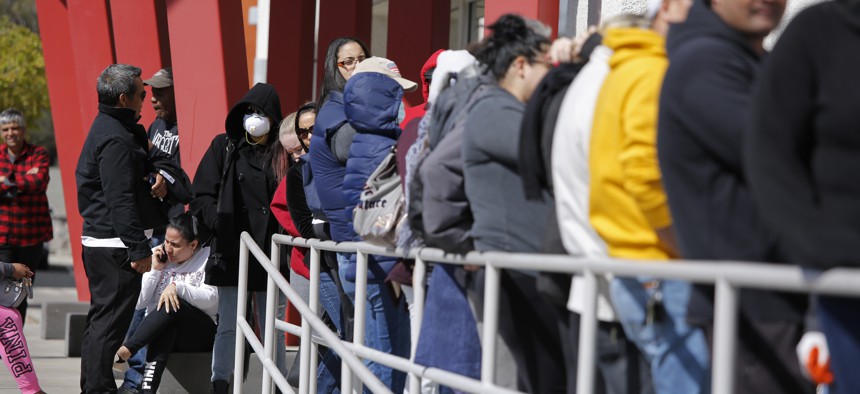States Ease Access to Unemployment As Claims Climb

People wait in line for help with unemployment benefits at the One-Stop Career Center, Tuesday, March 17, 2020, in Las Vegas. AP Photo/John Locher
Unemployment claims jumped 33% this week and are expected to climb much higher as the economic fallout from the coronavirus outbreak worsens.
Faced with a deluge of unemployment claims, some states are waiving waiting periods and forgoing work search requirements to speed up laid-off workers’ access to benefits.
Unemployment claims jumped nationwide by 33% last week as more and more businesses reduced hours or closed amid the coronavirus outbreak. But economists say that’s just the start of what is expected to be a steady onslaught of out-of-work people who need help.
Forty-three states require people filing unemployment claims to wait a week before they can begin receiving benefits, according to the National Employment Law Project.
New York, Nevada, and California are among the states that have waived these waiting periods and will give people access to unemployment benefits the first week they are out of work.
Nevada Gov. Steve Sisolak said the changes were meant to help ease Nevadans’ access to benefits when they need them the most.
The Economic Policy Institute estimates 5.25 million jobs will be lost by summer. States expected to be hardest hit include those where the hospitality industry makes up a larger share of employment, such as Nevada, Hawaii and Florida.
In Nevada, where two out of every five jobs are in leisure, hospitality, or retail, EPI estimates a 5.3% loss of private-sector jobs.
The hospitality and travel industry have been hit particularly hard as governors across the country have issued restrictions on large gatherings in order to halt the spread of the coronavirus. These orders have prevented conventions, concerts and other entertainment events from taking place. In many states, bars and restaurants have also closed or restricted dine-in service.
The onslaught of unemployment filings has been so swift that several state websites crashed because of high traffic.
In Washington, D.C., more than 7,500 unemployment claims have been filed since Monday. The city council passed emergency legislation this week that removes work search provisions that require beneficiaries to continue applying for jobs while unemployed.
D.C. Councilmember Elissa Silverman, who chairs the labor and workforce committee, said that provision was struck because the hope is that once businesses reopen and the economy rebounds workers will be able to return to their old jobs.
But in a city with a high cost of living, Silverman said she’s concerned that unemployment benefits, which are capped at $444 a week, are “unrealistic and unsatisfactory to meet people’s bills.”
At the D.C. Department of Employment Services on Thursday, which was closed to the public except for an information desk, former Marriott hotel banquet worker Mohammad Haque was among those trying to check on his unemployment claim. Haque said he and most of his co-workers had their hours cut to nothing last week.
“Rent is the problem, but everything is a crisis,” Haque said.
On Capitol Hill, federal lawmakers passed legislation this week that expands paid sick and emergency leave to some workers affected by the coronavirus. The bill also provides $1 billion in grants for states to pay for activities related to processing and paying unemployment insurance. Lawmakers are now in discussions on a third bill that would provide further economic stimulus.
While the Trump administration is pushing for direct cash assistance that could be provided to Americans under a certain income threshold, Democrats have said unemployment insurance needs to be bolstered more so that those who truly need help can get it.
But experts say there are merits to handing out cash. Expansion of unemployment benefits would provide more help to those who qualify, but the problem is that “a ton of people fall through the cracks of our unemployment system,” said Heidi Shierholz, a senior economist at the Economic Policy Institute.
“Checks to everyone is a way to get to people who fall through the system,” she said.
OTHER STORIES on Route Fifty:
-
Governments Look to Convert Empty College Dorms Into Temporary Medical Centers
-
Vermont and Minnesota Now Recognize Grocery Employees as Emergency Workers
-
Local Economies Most Vulnerable to Coronavirus-Driven Recession Identified in New Analysis
-
As Ridership and Revenues Plunge, Transit Agencies Seek Financial Aid
Andrea Noble is a staff correspondent with Route Fifty.
NEXT STORY: What the Coronavirus Stock Meltdown Could Mean for Pensions





